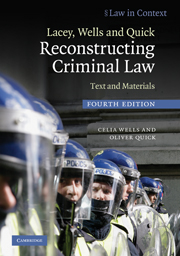Book contents
- Frontmatter
- Contents
- Preface
- Table of cases
- Table of statutes
- Section I Approaching Criminal Law
- Section II Law, Order and Security
- Section III Interpersonal Violence; Drugs and Alcohol Abuse; Offence Preparation and Participation
- Section IV Property and Propriety
- 11 Defining and Defending Private Property
- 12 Constructing Property in Criminal Law
- 13 Property Rights and Criminal Enforcement
- Section V Regulating Sexuality and Bodily autonomy
- Section VI Making a Killing
- Bibliography
- Index
- References
11 - Defining and Defending Private Property
from Section IV - Property and Propriety
Published online by Cambridge University Press: 05 June 2012
- Frontmatter
- Contents
- Preface
- Table of cases
- Table of statutes
- Section I Approaching Criminal Law
- Section II Law, Order and Security
- Section III Interpersonal Violence; Drugs and Alcohol Abuse; Offence Preparation and Participation
- Section IV Property and Propriety
- 11 Defining and Defending Private Property
- 12 Constructing Property in Criminal Law
- 13 Property Rights and Criminal Enforcement
- Section V Regulating Sexuality and Bodily autonomy
- Section VI Making a Killing
- Bibliography
- Index
- References
Summary
Conceptions of property in social and political thought
The institutions of private property and the ‘free market’ through which it is exchanged are core components of modern Western societies. In liberal thought, the model of individual property rights underpins the general conception of personal rights; the ‘ultimate’ human right is often seen as one of self-ownership, and the paradigm of the free individual is the actor in the market. The protection of private property rights is therefore an important concern of criminal regulation, and the perceived success of the criminal justice system in this respect is central to judgments about its efficacy and legitimacy. Criminal law's regulation of property takes place within a framework of civil law, which sets up property rights in laws relating to land tenure, ownership of personal goods and transfers of ownership by contract, gift or succession: criminalisation of property crime is therefore just one among a range of legal arrangements which underpin the conditions of trust and security of expectations which allow a market economy to flourish. Most of the time the idea of what counts as legally protected property is uncontested – whether it is tangible items such as a car, a mobile phone – or intangible such as a bank account – but technological developments such as the explosion in economic activity conducted via the internet have raised further questions.
- Type
- Chapter
- Information
- Lacey, Wells and Quick Reconstructing Criminal LawText and Materials, pp. 341 - 371Publisher: Cambridge University PressPrint publication year: 2010

